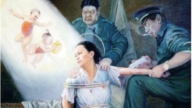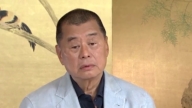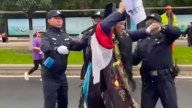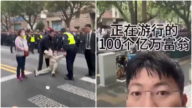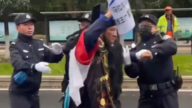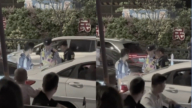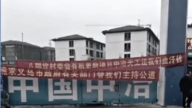【新唐人2012年6月14日讯】自薄熙来下台后,中共政治局委员张德江被紧急调往重庆。随后,重庆接连不断的爆发群体抗争事件。在重庆万盛事件还没有结束的时候,重庆双桥民间抗暴又不断升级,当局采取暴力镇压的手段,导致民间更大的不满,张德江似乎陷入泥潭,难以应对。
重庆市万盛区万人的反合并抗争,从4月爆发至今,政府还没有拿出善后方案,最近,重庆又爆发了大足新区双桥市民的抗争事件。
《大纪元》新闻网报导,薄熙来当政时,原双桥区被树为全国的所谓样板区,实行农村城市化,招商引资热炒得十分火爆。因此农村耕地被政府大量圈占,征收价每亩约一万元左右,但当局转手倒卖给开发商,每亩高达几十万元,甚至超过百万,造成双桥区粮田大量荒废,工厂林立。
而双桥区的党政要员,上至区委书记、区长,下至村级的村长、队长,在炒卖土地不法活动中巧立名目,中饱私囊,大发横财,一夜之间成为腰缠万贯的暴发户。利益受到损害的农民们为了拿回政府当时承诺的权益,开始了一波波上访维权运动。
自薄熙来下台后,中共政治局委员张德江被紧急调往重庆,在处理双桥区民众的维权抗争时,张德江调动公安、防暴警察、武警、城管、保安等数千人,用暴力驱逐聚集的农民群众,造成上千农民受伤,导致民间更大不满。双桥的工商士农,各个阶层自发的声援无辜农民,并掀起罢工罢市,抗议当局。事态还在不断的蔓延扩展。
美国“哥伦比亚大学”政治学博士、时政评论家李天笑:“张德江现在在重庆陷入泥潭,整个的重庆到处是抗议,接连不断,而且声势也很大。”
独立评论员洪剑表示,重庆是个烂摊子,薄熙来掌权时留下的后遗症太多,太复杂,随时可能引爆。
洪剑:“其实张德江是血债派人物,他在镇压法轮功、镇压维权人士、掩埋温州动车残骸、贪腐腐败方面劣迹斑斑,这样的一个人,为什么能够接掌重庆那一块呢?张德江他这个血债派么,他的本性不改,他还是用了残酷镇压的手段去来对付民众的维权事件,这一个事件已经引起了全民的公愤。”
据报导,经过了2个月的万人群体抗争骚乱,万盛区当地民众与警方出现互不侵犯的僵持状态。万盛区目前即使民众三五成群,白天在街头聚集,维稳单位不会主动动手,双方都相对疲累。有中国民间维权团体呼吁当局,让万盛全区市民通过投票来解决问题。
大陆维权团体《中国天网人权事务中心》负责人黄琦呼吁,既然目前万盛地区情势僵持,政府是否考虑采取区内全民公投方式,让民众选择行政区属的最佳解决方案,以此作为今后解决公民社会类似矛盾和冲突的方法。
而万盛居民向《天网》表示,官方已派人征求民间意见,但咨询流于形式,没有诚意,当局一如既往的采取统战策略。
采访编辑/常春 后制/肖颜
Mass Protests in Chongqing Escalate:
Zhang Dejiang ‘Stuck in Mud’
After Bo Xilai was removed, Zhang Dejiang, a member
of the Chinese Communist Party (CCP) Politburo,
was transferred to Chongqing immediately.
This triggered successive mass protests in Chongqing.
The protest in Wansheng District,
Chongqing has not yet been resolved.
Another protest began in Shuangqiao District
and is still escalating.
The authorities have suppressed these protests
by brutal force, which has aroused more anger.
Zhang Dejiang is now ‘stuck in mud’,
and it is hard for him to find a way out.
Since the mass protest against a merging of districts
in Wansheng District in April,
the government has not yet found a way
to resolve the situation.
Recently, thousands of residents in Chongqing’s former
Shuangqiao District began to protest against the merger of their district with Dazu District.
According to The Epoch Times, the former
Shuangqiao District was regarded as a sample
of rural urbanization under Bo Xilai,
and foreign investments were heavily introduced.
The government expropriated farms massively,
with compensation approximately 20,000 Yuan per acre.
The government then went on to sell the land to developers
at a high prices of several hundred thousand Yuan, Prices even exceeded over 1 million.
As a result, much of the land in Shuangqiao District
went unused, and many factories began appearing.
By land confiscation, all levels of Shuangqiao District
officials began to line their pockets, quickly becoming rich.
This spanned from party secretaries, district chiefs
to village heads and team captains.
To get the compensation promised
by the government, villagers appealed.
They began waves of rights protection movements.
After Bo Xilai was removed, Zhang Dejiang,
a member of the CCP’s Politburo,
was transferred to Chongqing immediately to tackle
the mass protests in Shuangqiao District.
Zhang dispatched thousands of public security officers,
riot police, armed police, and urban management officers.
They were to disperse the crowd by force. Over a thousand
farmers were injured and stronger dissatisfaction was aroused.
Many people in Shuangqiao District started their silent
support for the innocent farmers by going on strike. The conflict is still spreading now.
Li Tianxiao, a Doctor of Political Science
at Columbia University commented.
“Zhang Dejiang is ‘stuck in mud’, with constant
large-scale protests all over Chongqing.”
Hong Jian, an independent commentator, said that
Chongqing has a massive debt left by Bo Xilai.
Things are so complicated. It is like a bomb
that could be set off at any time.
Hong Jian: “Zhang Dejiang is a member of the blood-debt
faction, with a notorious record of persecuting Falun Gong.
He also has a record of suppressing human rights activists,
burying the Wenzhou train incident, and corruption.
How can such a person take over charge of Chongqing?
As a blood-debt faction member with such evil nature,
Zhang keeps using brutal force to tackle mass incidents and has aroused wide anger.”
It is reported that 2 months after the mass protest
in Chongqing’s Wansheng District, residents and police are now at a deadlock.
Currently, even if a small number of three to five residents
gather in streets during the day, the police take no action.
Both sides are held by each other.
Some rights protection organizations in China appealed
to the authorities to solve the problem by a referendum in Wansheng.
Huang Qi, Chair of China Tianwang Human Rights Service,
a rights protection organization in China, appealed
to the government for a referendum within the district
to solve the current deadlock in Wansheng.
This was to let residents decide the administrative division
of their district and use referendum to solve further social conflicts in the future.
Wansheng residents told Tianwang that the authorities
had asked for public opinions, but it was merely a formality.
They had no sincerity and tended to use
the united front strategy as usual.


